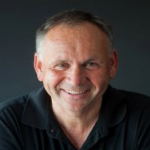“The aim is to develop an efficient system to store and recover freshwater in a brackish/saline groundwater environment”
 Interview partner Marcel Paalman is a geochemist engineer and received his PhD for a study on the behavior of pollutants in sediments under various estuarine conditions at the University of Utrecht. Afterwards, he worked for many years at various public organizations on water policy subjects such as the implementation of the European Water Framework Directive. Since 2009 he works for KWR Watercycle Research Institute in the Netherlands and is developing new tools and technics related to the water cycle and is now demo site leader of Westland within DESSIN.
Interview partner Marcel Paalman is a geochemist engineer and received his PhD for a study on the behavior of pollutants in sediments under various estuarine conditions at the University of Utrecht. Afterwards, he worked for many years at various public organizations on water policy subjects such as the implementation of the European Water Framework Directive. Since 2009 he works for KWR Watercycle Research Institute in the Netherlands and is developing new tools and technics related to the water cycle and is now demo site leader of Westland within DESSIN.
Mr. Westland, what has the Westland demo site achieved in the first 10 months of activity?
Westland’s first achievements began during the summer, as the Freshkeeper was installed and tested and the groundwater was analyzed on particles and solutes. Due to the success of the Westland Demo Site in Netherlands the opportunities of ASR for water management (eg as tool for preventing flooding) were recognized and a Foundation Waterbuffer is now established. Our long term goals are to improve the concept of ASRO (ASR in combination with Reversed Osmosis) and also turn the site into a showcase location.
Is the demo site using new technologies? What kind of future and practical applications could these technologies have?
Yes, we have been using a new development of the Multiple Partial Penetrating Well system in the first place and are now combining it with the Freshkeeper. The aim is to develop an efficient system to store and recover freshwater in a brackish/saline groundwater environment. The technology can be practiced in other deltaic areas with an abundance of saline water and a shortage of freshwater. Because most people live in deltaic areas, the technology contributes to the supply of freshwater for drinking water, agricultural use, etc.
Which characteristics make the Westland demo site unique?
In the first place of course the presence of the horticulture sector, with a high production of vegetables and very effective use of natural sources, such as water and nutrients. Secondly, we are the only location where ASRO is developed, applied and shown.
Why did you choose Westland? Which problems poses and which are the solutions you are searching?
The problem for the Westland horticulture farmers is the availability of irrigation water (always enough, with good quality and a suitable price). The subsurface storage and recovery of freshwater contributes to the goals of the sector, improving the self-sufficiency and climate resilience in water supply.